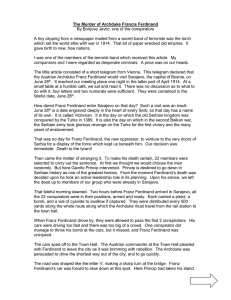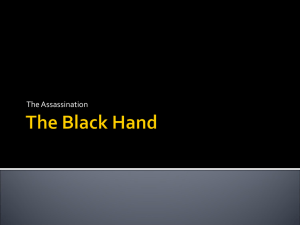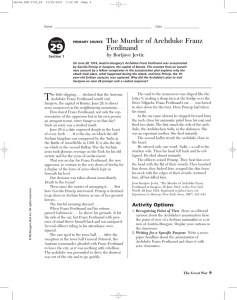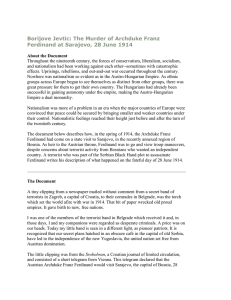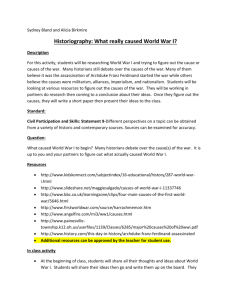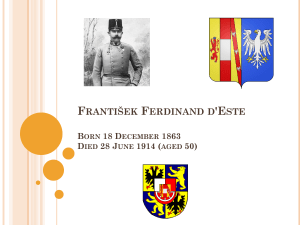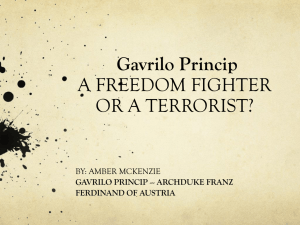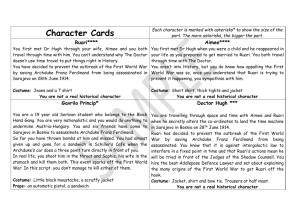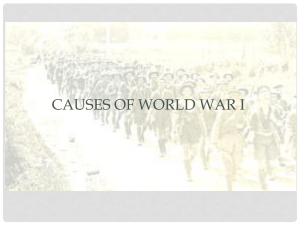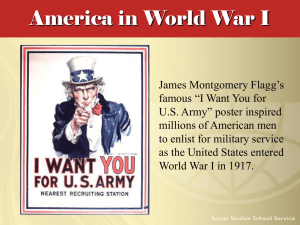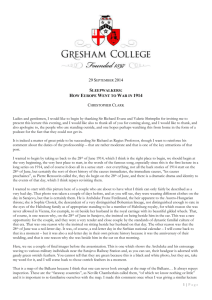The Murder of Archduke Franz Ferdinand at Sarajevo – 1914
advertisement
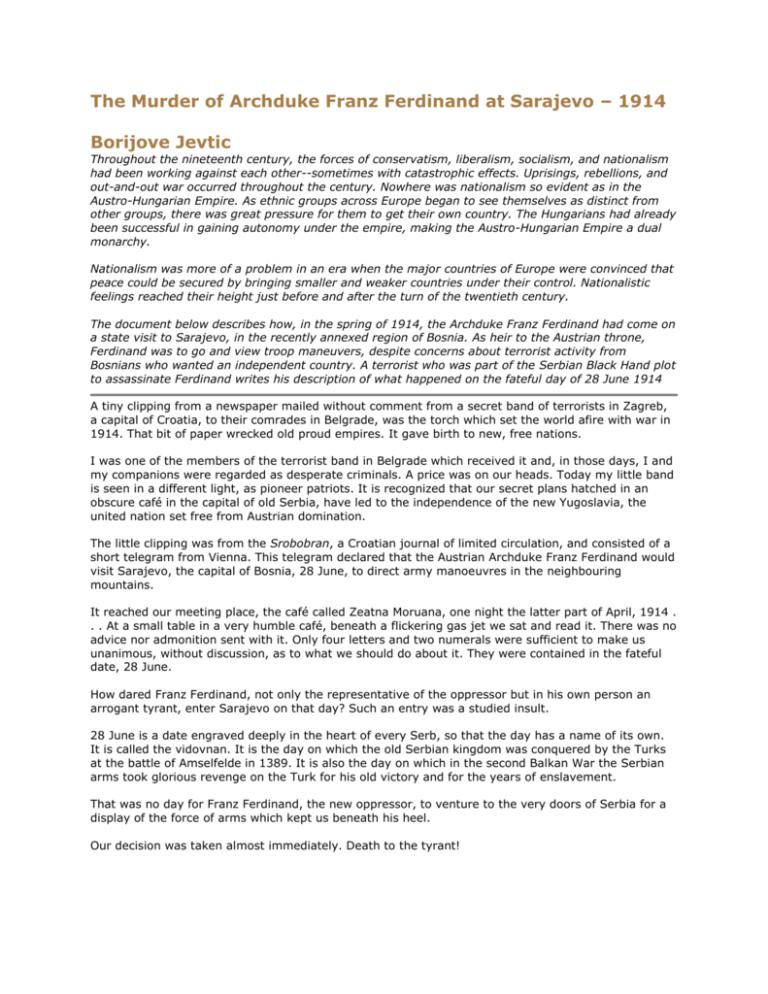
The Murder of Archduke Franz Ferdinand at Sarajevo – 1914 Borijove Jevtic Throughout the nineteenth century, the forces of conservatism, liberalism, socialism, and nationalism had been working against each other--sometimes with catastrophic effects. Uprisings, rebellions, and out-and-out war occurred throughout the century. Nowhere was nationalism so evident as in the Austro-Hungarian Empire. As ethnic groups across Europe began to see themselves as distinct from other groups, there was great pressure for them to get their own country. The Hungarians had already been successful in gaining autonomy under the empire, making the Austro-Hungarian Empire a dual monarchy. Nationalism was more of a problem in an era when the major countries of Europe were convinced that peace could be secured by bringing smaller and weaker countries under their control. Nationalistic feelings reached their height just before and after the turn of the twentieth century. The document below describes how, in the spring of 1914, the Archduke Franz Ferdinand had come on a state visit to Sarajevo, in the recently annexed region of Bosnia. As heir to the Austrian throne, Ferdinand was to go and view troop maneuvers, despite concerns about terrorist activity from Bosnians who wanted an independent country. A terrorist who was part of the Serbian Black Hand plot to assassinate Ferdinand writes his description of what happened on the fateful day of 28 June 1914 A tiny clipping from a newspaper mailed without comment from a secret band of terrorists in Zagreb, a capital of Croatia, to their comrades in Belgrade, was the torch which set the world afire with war in 1914. That bit of paper wrecked old proud empires. It gave birth to new, free nations. I was one of the members of the terrorist band in Belgrade which received it and, in those days, I and my companions were regarded as desperate criminals. A price was on our heads. Today my little band is seen in a different light, as pioneer patriots. It is recognized that our secret plans hatched in an obscure café in the capital of old Serbia, have led to the independence of the new Yugoslavia, the united nation set free from Austrian domination. The little clipping was from the Srobobran, a Croatian journal of limited circulation, and consisted of a short telegram from Vienna. This telegram declared that the Austrian Archduke Franz Ferdinand would visit Sarajevo, the capital of Bosnia, 28 June, to direct army manoeuvres in the neighbouring mountains. It reached our meeting place, the café called Zeatna Moruana, one night the latter part of April, 1914 . . . At a small table in a very humble café, beneath a flickering gas jet we sat and read it. There was no advice nor admonition sent with it. Only four letters and two numerals were sufficient to make us unanimous, without discussion, as to what we should do about it. They were contained in the fateful date, 28 June. How dared Franz Ferdinand, not only the representative of the oppressor but in his own person an arrogant tyrant, enter Sarajevo on that day? Such an entry was a studied insult. 28 June is a date engraved deeply in the heart of every Serb, so that the day has a name of its own. It is called the vidovnan. It is the day on which the old Serbian kingdom was conquered by the Turks at the battle of Amselfelde in 1389. It is also the day on which in the second Balkan War the Serbian arms took glorious revenge on the Turk for his old victory and for the years of enslavement. That was no day for Franz Ferdinand, the new oppressor, to venture to the very doors of Serbia for a display of the force of arms which kept us beneath his heel. Our decision was taken almost immediately. Death to the tyrant! Then came the matter of arranging it. To make his death certain twenty-two members of the organization were selected to carry out the sentence. At first we thought we would choose the men by lot. But here Gavrilo Princip intervened. Princip is destined to go down in Serbian history as one of her greatest heroes. From the moment Ferdinand's death was decided upon he took an active leadership in its planning. Upon his advice we left the deed to members of our band who were in and around Sarajevo under his direction and that of Gabrinovic, a linotype operator on a Serbian newspaper. Both were regarded as capable of anything in the cause. The fateful morning dawned. Two hours before Franz Ferdinand arrived in Sarajevo all the twenty-two conspirators were in their allotted positions, armed and ready. They were distributed 500 yards apart over the whole route along which the Archduke must travel from the railroad station to the town hall. When Franz Ferdinand and his retinue drove from the station they were allowed to pass the first two conspirators. The motor cars were driving too fast to make an attempt feasible and in the crowd were Serbians: throwing a grenade would have killed many innocent people. When the car passed Gabrinovic, the compositor, he threw his grenade. It hit the side of the car, but Franz Ferdinand with presence of mind threw himself back and was uninjured. Several officers riding in his attendance were injured. The cars sped to the Town Hall and the rest of the conspirators did not interfere with them. After the reception in the Town Hall General Potiorek, the Austrian Commander, pleaded with Franz Ferdinand to leave the city, as it was seething with rebellion. The Archduke was persuaded to drive the shortest way out of the city and to go quickly. The road to the manoeuvres was shaped like the letter V, making a sharp turn at the bridge over the River Nilgacka. Franz Ferdinand's car could go fast enough until it reached this spot but here it was forced to slow down for the turn. Here Princip had taken his stand. As the car came abreast he stepped forward from the curb, drew his automatic pistol from his coat and fired two shots. The first struck the wife of the Archduke, the Archduchess Sofia, in the abdomen. She was an expectant mother. She died instantly. The second bullet struck the Archduke close to the heart. He uttered only one word; 'Sofia' - a call to his stricken wife. Then his head fell back and he collapsed. He died almost instantly. The officers seized Princip. They beat him over the head with the flat of their swords. They knocked him down, they kicked him, scraped the skin from his neck with the edges of their swords, tortured him, all but killed him. Then he was taken to the Sarajevo gaol (jail). The next day he was transferred to the military prison and the round-up of his fellow conspirators proceeded, although he denied that he had worked with anyone. He was confronted with Gabrinovic, who had thrown the bomb. Princip denied he knew him. Others were brought in, but Princip denied the most obvious things. The next day they put chains on Princip's feet, which he wore till his death. His only sign of regret was the statement that he was sorry he had killed the wife of the Archduke. He had aimed only at her husband and would have preferred that any other bullet should have struck General Potiorek. The Austrians arrested every known revolutionary in Sarajevo and among them, naturally, I was one. But they had no proof of my connection with the crime. I was placed in the cell next to Princip's, and when Princip was taken out to walk in the prison yard I was taken along as his companion. 1. Who is the "oppressor" that Franz Ferdinand represents? Why is Franz Ferdinand called the "new oppressor"? 2. Why is the date, June 28, an unfortunate date for Franz Ferdinand to visit Sarajevo? 3. Describe the scene at the time of murder. 4. How does the author justify the events?
